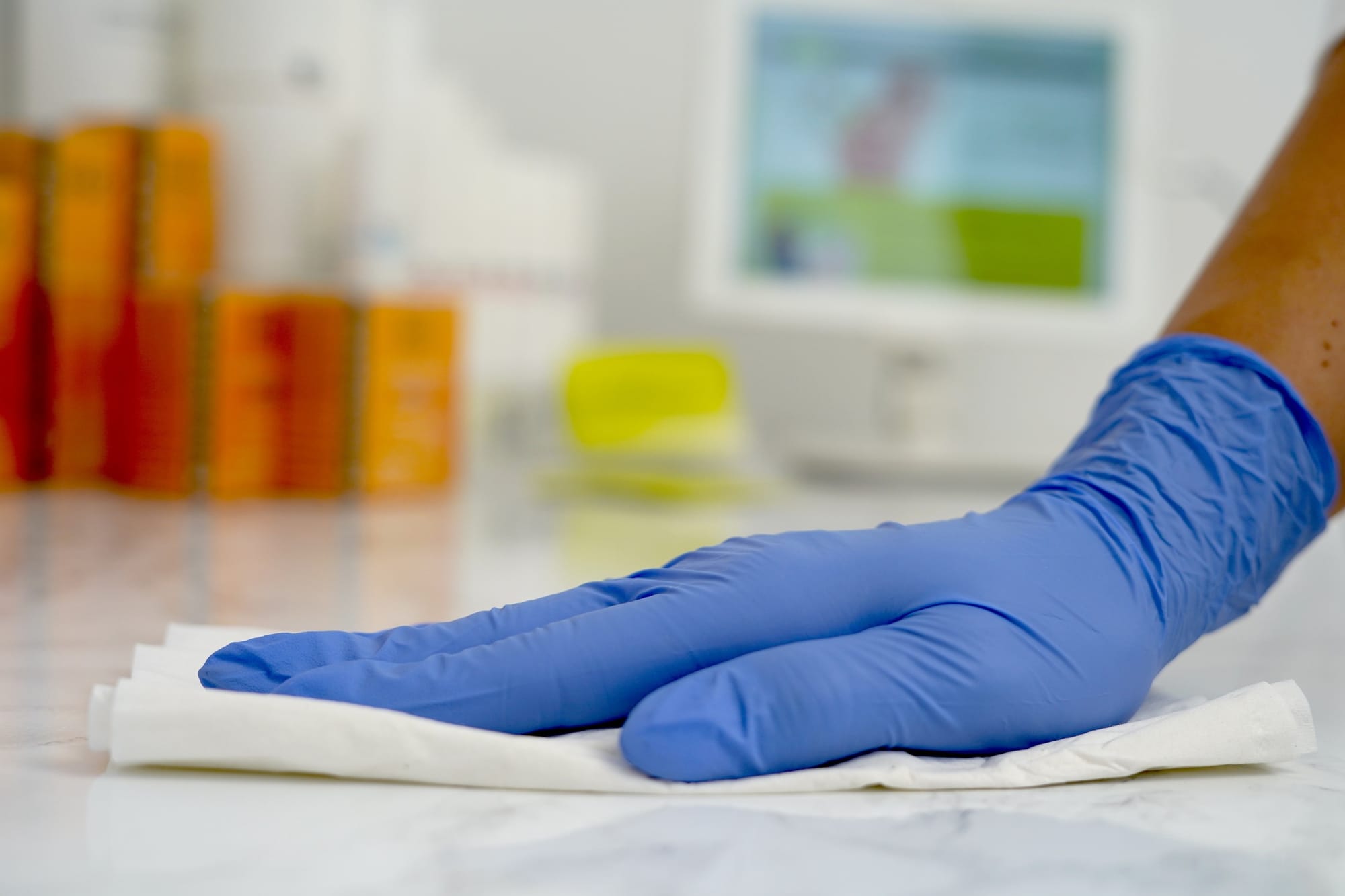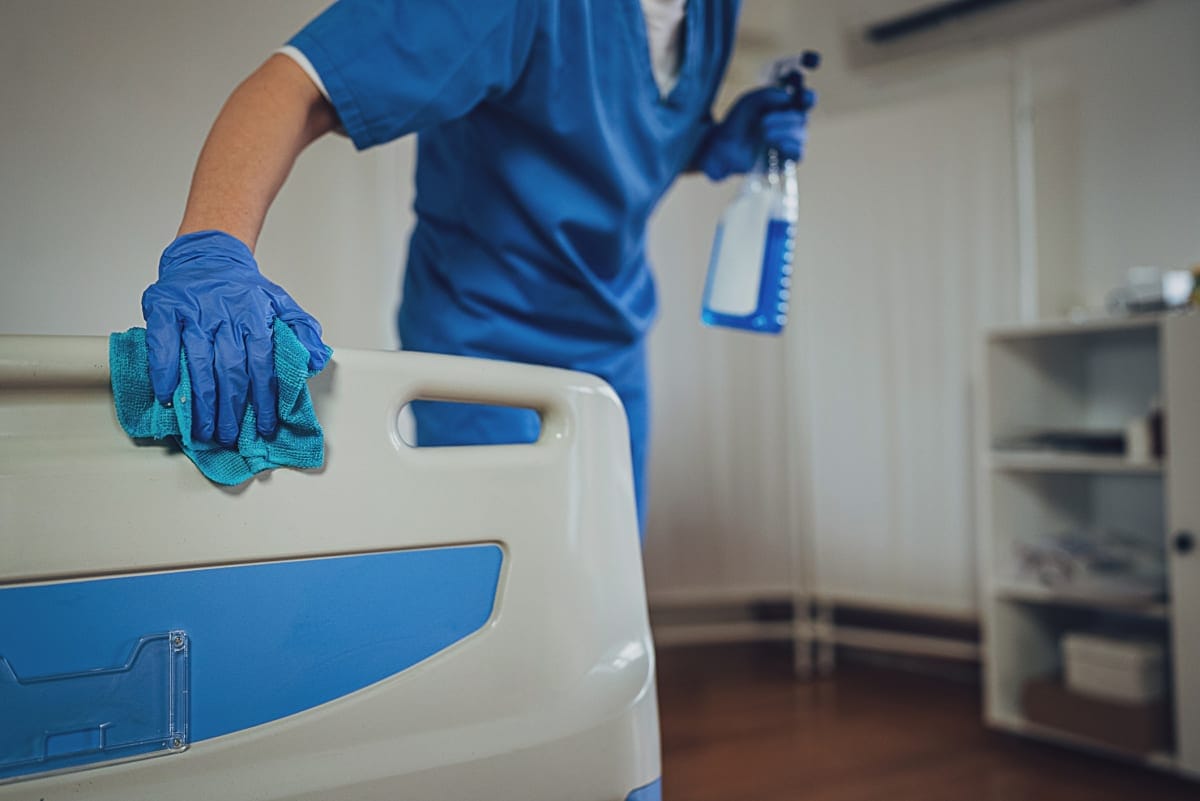
In healthcare settings, where patients are already vulnerable, healthcare-associated infections (HAIs) are a significant and persistent threat.
These infections, which patients acquire during their hospital stay, can lead to severe complications, prolong recovery times, and even result in death.
A groundbreaking clinical trial with researchers from Monash and other Australian universities was recently published in The Lancet Infectious Diseases, and has provided compelling evidence that improved hospital cleaning practices can dramatically reduce the incidence of these infections.
A promising reduction in infection rates
The CLEaning and Enhanced disiNfection (CLEEN) study implemented an environmental cleaning bundle – comprising standardised cleaning methods, staff education, and regular auditing – in 10 hospital wards, focusing on cleaning of shared medical equipment in hospitals, such as wheelchairs, walking frames, blood pressure monitors and commodes.

The results were astonishing – a 35% reduction in HAIs was observed across these wards. This outcome has sparked renewed interest in the importance of hospital cleanliness, and raised essential questions about how hospitals can better-protect patients.
While hand hygiene has long been at the forefront of infection prevention strategies, this study reinforces that cleaning practices are equally vital. Far from being a secondary measure, thorough environmental cleaning is essential in creating a safe environment for patients.
The human cost of cutting back on cleaning
Hospitals, like many other institutions, are under constant pressure to optimise budgets and reduce costs. In some cases, this has led to a reduction in cleaning services – a trend that could have devastating consequences.
Dr Kate Browne, from Avondale University in New South Wales, is the clinical trial coordinator for the CLEEN study. She stresses the risks associated with such cutbacks, and says the findings highlight the important role that cleaning staff play in keeping patients safe in hospital.
By demonstrating the life-saving impact of rigorous cleaning practices, this study gives hospital administrators concrete evidence to prioritise environmental hygiene, even in the face of financial constraints, Dr Browne says.
A global impact
The significance of this research goes beyond the borders of Australia. With hospitals around the world grappling with similar challenges, the findings have the potential to influence global healthcare practices. This approach could be seamlessly integrated into existing hospital networks worldwide.
In our study, we had about 100 more infections before our intervention; a proportion of these would have resulted in major complications resulting from the infection, including death.
Having robust trials means you can influence clinical education and practice, policies, and national and international guidelines. We anticipate this study will have a major impact for decision-makers globally.
Cleaning shared equipment reduces infection – Latest paper
We have published results from a major part of the CLEEN study in the Lancet Infectious Disease today.
Article: https://t.co/RW08KML23Y
Freely available: https://t.co/Rtc1seWN8v@TheLancetInfDis #IDtwitter— Brett Mitchell (@1healthau) August 13, 2024
The CLEEN study’s robust methodology and clear results provide a compelling case for health systems worldwide to re-evaluate and potentially overhaul their cleaning protocols.
Beyond hand hygiene
One of the key takeaways from this research is the need for a multifaceted approach to infection prevention. While hand hygiene has rightfully received significant attention, it’s clear that focusing solely on one aspect of infection control is insufficient. Hospitals must adopt a comprehensive strategy that includes environmental cleaning, hand hygiene, proper sterilisation procedures, and effective staff training.
The introduction of a cleaning bundle such as ours offers a template for hospitals looking to improve their infection control measures. Importantly, this bundle can be adapted to suit different hospital environments, making it a versatile solution for a variety of healthcare settings.
The path forward
With such promising results, the natural question is: Where do we go from here?
For hospitals to fully benefit from this research, a few key steps need to be taken.
First, health authorities and hospital administrators should look at these findings and then educate clinical staff, decision-makers and policymakers about the benefits of enhanced cleaning practices. Hospitals can create a culture that values cleanliness as a cornerstone of patient safety.
Second, investment in training and education is essential. Cleaning staff, often overlooked in the broader conversation about infection control, play a critical role in maintaining a safe environment. Providing them with the knowledge, tools and recognition they deserve is vital to sustaining the benefits observed in the study.
Lastly, this research should be a catalyst for broader conversations about healthcare funding and resource allocation. Cutting back on cleaning might offer short-term savings, but the long-term costs – in terms of patient safety, extended hospital stays, and even lives lost – are far higher. By making smart investments in prevention, hospitals can ultimately reduce overall healthcare costs while improving patient outcomes.
This study marks a pivotal moment in our understanding of infection prevention in hospitals, and as hospitals worldwide continue to battle infections, these findings offer a blueprint for success. Cleaning saves lives.
This article was co-authored with Dr Kate Browne, Postdoctoral Research Fellow, Clinical Trial Coordinator, School of Nursing and Health, Avondale University, and Professor Brett Mitchell (AM), Professor of Nursing and Health Services Research, Avondale University, University of Newcastle.





